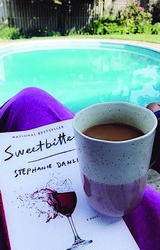It’s finally that time of the year… the sun is out, windows are down, and music is blasting at full volume while on the way to the beach. Students have little worries since classes have officially come to a well-deserved end. Before our brains as students are officially turned off for a four-month break, it might be wise to consider throwing a book or two in that beach bag (along with some sunscreen).
Throughout middle and high school, it is common for students to be assigned summer reading to help them work their brains on days off. Some of the common books assigned include, To Kill a Mockingbird, Fahrenheit 451, and 1984. After summer break these books were then often analyzed as a class.
College students, on the other hand, often do not have this responsibility of summer work. However, that does not necessarily mean that they should cease all things to do with reading. It is extremely important that students continue to read over the summer, and there are various reasons why this is so.
Carly Steakin, a junior English student, finds reading over the summer break to be just as important as reading during the school year. “When you read over the summer, you’re continuing to use skills that you would be using during school,” Steakin said. “It’s a great way to keep up with those higher-level thinking skills.”
In the summer, students tend to shut their brains off for break. By doing some reading throughout these months, they will be able to relax mindlessly with a book and still be fully prepared for school work when September rolls back around.
 Linda Sacks, MAT, lecturer of English gave her input on the topic, “I teach a freshman course and every year I get students that want to increase their vocabulary. My response is always to have them read in their free time, including over the summer because by reading as much as possible, you can gain many different skills.”
Linda Sacks, MAT, lecturer of English gave her input on the topic, “I teach a freshman course and every year I get students that want to increase their vocabulary. My response is always to have them read in their free time, including over the summer because by reading as much as possible, you can gain many different skills.”
Not only does summer reading allow students to practice critical skills, but it also gives them a reason to put their phones down. Even if they only spend 20 minutes a day reading, this is time that could be distraction-free away from phones.
Cell phones have are a huge distraction in everyday life, so take a break and put it down for a while. Reading over the summer when no assignments are due to work on, allows students to relax and improve their reading skills and lets them put down their phone. Little by little, they can learn to rely less on their phones for fun.
Summer reading also enables students to have freedom in the books they chose. Whereas, during the school year, their reading material is assigned to them. Sabrina Carulli, a junior English and special education student, said, “ I enjoy reading in the summer because I get the chance to read books that I like and I actually have time to sit down, focus and read for fun.”
Often, students are too focused on school work during the semester to read books that they would choose for themselves. It is important to indulge in these guilty pleasures, especially since it still involves engaging in higher-level thinking. Choosing a good book is a novelty, and can also give way to finding different genres you are passionate about.
Before you spend your entire summer reading, you need to first make sure that you’re picking the right books for you. If you’re looking for a thriller, Steakin recommended Girl on the Train by Paula Hawkins. If romance is more your style, then take a walk down the Nicholas Sparks aisle of your local Barnes and Noble.
If poetry books interest you, Carulli recommended Empty Bottles Full of Stories by R.H. Sin and Robert M. Drake.
If you are having trouble finding a good book, spending an hour in your local bookstore is a great way to start. Browse through the best-sellers, and even talk to other readers or employees on what their current obsession is now.
Any of these books, plus countless others, will help you to keep up those reading skills. Lastly, don’t be a bummer, read this summer.
PHOTOS TAKEN by Chloe Barone




